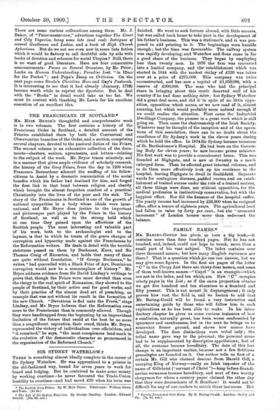THE FRANCISCANS IN SCOTLAND.* MR. Mora BRYCE'S thoughtful and comprehensive
work is in two volumes. The first contains a history of the Franciscan Order in Scotland, a detailed account of ths Friaries established there by both the Conventual and Observantine branches of the Order, and a section, comprising several chapters, devoted to the pastoral duties of the Friars.
• The second volume is an exhaustive collection of the docu- ments—charters, sasines, agreements, and letters—relating to the subject of the work. Mr. Bryce traces minutely, and in a manner that gives ample evidence of scholarly research, the history of the Grey Friars, from the day in 1209 when Francesco Bernardone silenced the scoffing of his fellow- citizens in Assisi by a dramatic renunciation of the social benefits which his father had destined for him, and forged the first link in that bond between religion and charity which brought the almost forgotten comfort of a practical Christianity into the lives of the poor and the sick. The story of the Franciscans in Scotland is one of the growth of national sympathies in a body whose ideals were inter- national, and Mr. Bryce does justice to the important and picturesque part played by the Friars in the history of Scotland, as well as to the strong hold which at one time they gained upon the affections of the Scottish people. The most interesting and valuable part 'of his work, both to the archaeologist and to the layman, is that in which he treats of the grave charges of corruption and hypocrisy made against the Franciscans by the Reformation writers. He deals in detail with the terrible strictures passed on them by Buchanan, Knox, and Sir Thomas Craig of Riccarton, and holds that many of these are quite without foundation. "If George Buchanan," he writes," had quarrelled with a Black Friar of Ayr, Dominican corruption would now be a commonplace of history." Mr. Bryce adduces evidence from Sir David Lindsay's writings to prove that, though the Friars were more devoted than even the clergy to the real spirit of Romanism, they showed to the people of Scotland, by their active zeal for good works, and by their practice of the almost dead art of preaching, an example that was not without its result in the formation of the new Church. "Devotioun is fled unto the Freris," sings Lindsay, and Mr. Bryce believes that the Reformation owes more to the Franciscans than is commonly allowed. Though they were handicapped from the beginning by an improvident limitation of the future that could at the best be no more than a magnificent aspiration, their creed, thinks Mr. Bryce, represented the victory of individualism over officialdom, and "it remained," he says, "the most conspicuous land-riark in the evolution of the democratic character so pronounced in the organisation of the Reformed Church."










































 Previous page
Previous page